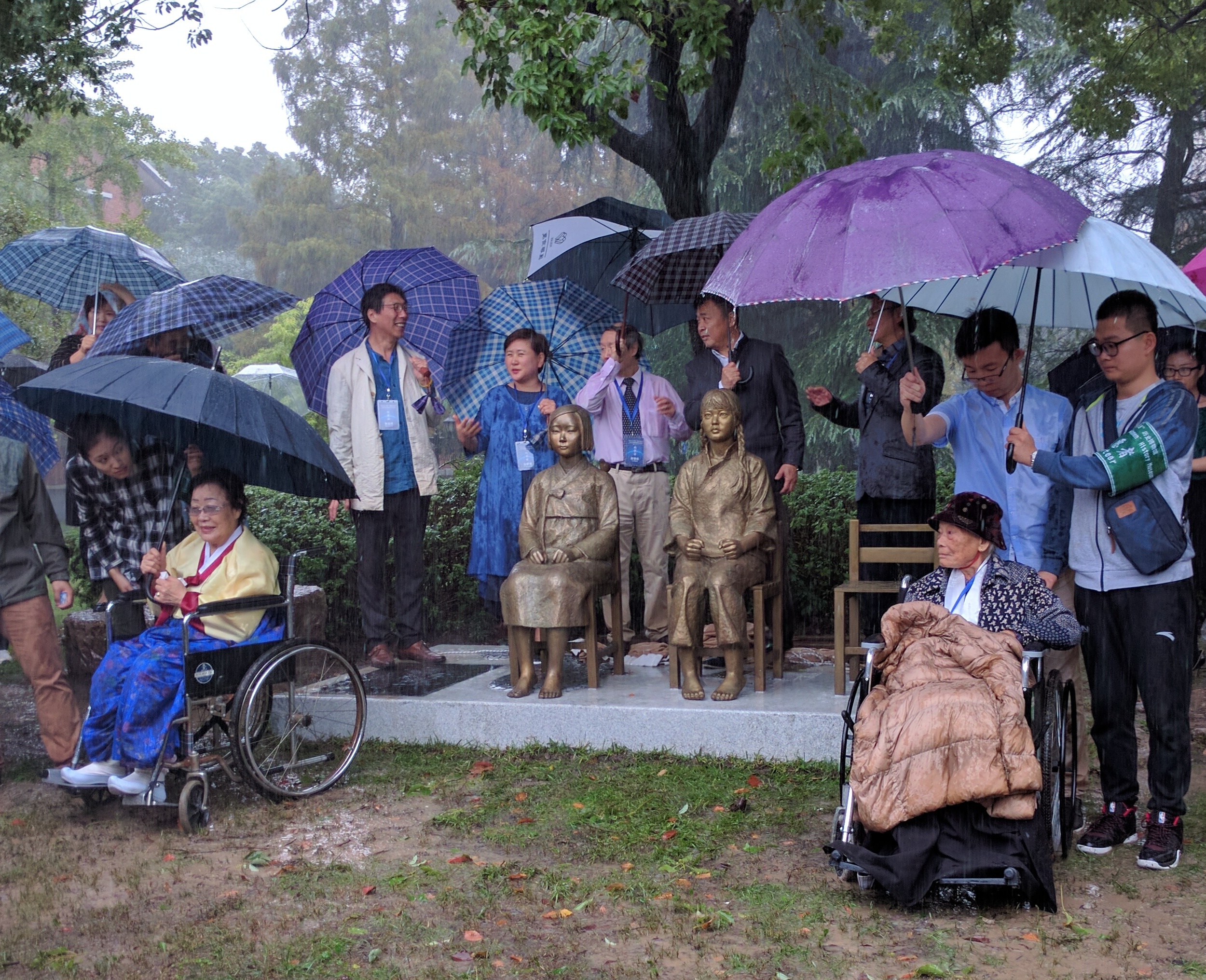San Francisco to Install First Major U.S. Memorial to WWII ‘Comfort Women’
Author Archives: administrator
First Comfort Women Memorial in China (October 22, 2016)
Global Alliance’s Most Recent Biennial Conference in Shanghai: October 21-23, 2016
May 15, 2018: 94-year-old Nanking Massacre survivor Mr. Chu-Yeh Chang shared his experience with about 150 Ridgewood High School students in Ridgewood, NJ at the “3rd Annual Making A Difference Speaker Series.”
Don Tow, President of NJ-ALPHA, also gave an overview of the various types of massive atrocities committed by the Japanese military in Asia during WWII. Mr. Chang and Don each received over 60 thank you letters from the students.
December 6, 2017: 80th Anniversary Commemoration of the Nanking Massacre: From the Eyes and Words of Eye Witnesses
A public event was held at the Monmouth Country Library Headquarter in Manalapan, NJ which presented the words of American, German, Japanese, and Chinese eyewitnesses describing what they saw and experienced during the Nanking Massacre of 1937-1938.
For the presentation presented that evening, click:
- Powerpoint file (clicking here leads to the Powerpoint file).
Also shown that evening was the 26.5-minute documentary based on John Magee’s home movie filmed during the Nanking Massacre that was smuggled out of China and widely shown in the U.S. and the world in 1938 (https://www.youtube.com/watch?v=H7R5N6qWScU).
October 26, 2017: An award-winning documentary by Robin Lung on finding the long-lost winner of the First (1942) Academy Award Best Documentary “KUKAN.”
Hawaii filmmaker Robin Lung investigates the case of Li Ling-Ai, the un-credited female producer of KUKAN, a landmark color film that revealed the atrocities of World War II in China. This public event was held at Brookdale Community College with Robin Lung present for the Q&A. Robin was a participant of the 2014 Peace & Reconciliation Asia Study Tour.
October 21, 2017: Readouts by NJ Participants of the 2017 Peace & Reconciliation Asia Study Tour
On the afternoon of Oct. 21, 2017, a public event was held at the YMCA at Berkeley Heights, NJ to hear the reports of the four NJ participants of the 2017 Peace & Reconciliation Asia Study Tour:
- Sue Elfenbein (Adjudicator, NJ Dept. of Labor): “Nanking Massacre Survivor and Museum”
- Bill Hegerich (Head, Social Studies Teacher, Ocean County Vocational and Technical School): “Sex Slaves”
- Felicia Panny (Social Studies Teacher): “Germ Warfare”
- Lisa Wiater (English Teacher, Ridgewood High School): “Upstanders: John Magee, John Rabe, Minnie Vautrin”
July 14-27, 2017: 2017 Peace and Reconciliation Asia Study Tour
The 2017 Peace and Reconciliation Asia Study Tour took place July 14-27, 2017 (14 days/13 nights). There were 16 participants accompanying Don Tow on this Study Tour.
For a full report, see the Study Tour page.
The next Peace and Reconciliation Asia Study Tour will be in the summer of 2020. There is no study tour in 2019.
May 6, 2017: Seminar on “Lessons from 19th Century U.S.-China Relation Applied to 21st Century” given by Don Tow, President of NJ-ALPHA, at the annual meeting of the “Alliance for Preserving Historical Accuracy of Foreign Invasions in China “ (APHAFIC) in San Diego, CA.
In the 19th century, under the leadership of Ambassador Anson Burlingame and Secretary of State William Seward, the U.S. for a brief period changed its foreign policy toward China from one based on “unequal treaties” to one based on “equality of nations.” Are there lessons that we can learn from the 19th century that can be applied to U.S.-China relationship in the 21st century?
This talk was based on Don’s article published in March 2017 in the China-U.S. Focus Digest with the title “U.S.-China Relationship Can Use Another Anson Burlingame”
April 24, 2017: Talk by 94-year-old Nanking Massacre survivor Mr. Chu-Yeh Chang and NJ-ALPHA President Don Tow at Ridgewood High School in Ridgewood, NJ as part of its “2nd Annual Making a Difference Speaker Series.”
Don talked about the forgotten holocaust of WWII. He talked about the massive and inhuman atrocities in Asia, especially in China, during WWII. He emphasized that there were many eye witnesses, foreigners and Chinese, who recorded what they saw and experienced in diaries, film, photos, and articles. He read several of the quotes from these eye witnesses.
Mr. Chang recalled his own experience as a 14th year old Nanking Massacre victim and survivor, and the tragedy his family experienced when his mother, 80-year-old great grandmother, and 11-year-old sister were raped, and his great grandmother was also killed. He ended his talk with the remark “In spite of the atrocities committed by the Japanese soldiers against my family, I am not seeking any revenge, and do not hold any animosity against the Japanese people. The fact that I have become a Christian has helped me to forgive the Japanese. I tell my three children and nine grandchildren that they must not hate, but they must never forget this part of history. I don’t want this kind of things to happen again to anyone else in the future.”
You can read the transcript of a similar earlier talk by Mr. Chang at: https://nj-alpha.org/Reference_Information_Articles/HTML_Articles/Chang_Chu_Yeh_English.html
or you can see another similar earlier talk by Mr. Chang at: https://www.youtube.com/watch?v=GlSxKO5Da2Y
Don received 99 thank you notes from the approximately 200 students and teachers who attended the program. Mr. Chang also received a similar box of thank you notes.

